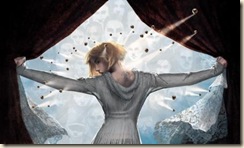The title was the first piece to arrive. I have lists of titles in my notebooks and this one was entered decades ago, just in case. I am a thrifty person.
In the eighties I wrote an unfinished novel, Starkiller, which  involved Sylvia Romilar (who, except for one line of dialogue, was in a coma the whole novel), Walter Roscoe, and Sylvia’s slinky sister, Wanda Paloma.
involved Sylvia Romilar (who, except for one line of dialogue, was in a coma the whole novel), Walter Roscoe, and Sylvia’s slinky sister, Wanda Paloma.
After losing interest in writing sf during the ‘90s and writing unseen screenplays in the ‘00s, I quit altogether. Then—
I moved to Oregon, where I have a quiet life. In 2007 I thought I’d give writing another shot, to see if it would be fun again. But with a different program:
1.) In the past, I would decide what I wanted to say and then put it in language accessible to 12-yr-olds. I wasn’t going to do that anymore. I had just been reading Watt by Samuel Beckett, Tristram Shandy and a few Jane Austen novels, and I liked what I read. So if I want to combine a lacy Austenian 80-word sentence with Beckett’s OCD, splattered with Hunter Thompson’s vocabulary, try and stop me.
2.) In my stories, stupid people should dance faster, because if they act up they are going to be punished, because they are most dangerous.
3.) I decided to write about life as we secretly know that it is: good people do bad things, bad people do good things, and some people are nasty and guilty and have fabulous lives.
5) I was going to characterize my people by showing or implying these contradictions and the complications they cause. For example:
“The next time I see you, if I'm different,
I want you to pretend you know me, even if you don't.”
“I will.”
“Tell me you'll never lie to me.”
“I won't.”
I recognize that this may be cryptic to literalists, pre-teens, and sociopaths.
I fully fully understand the ancient suspicion that muses whisper into the writer’s ear. I wrote the story, of course, but the cauldron that some of those things crawled out of is unfamiliar to me. After a few months’ separation from it, I read the story again and I had this creepy little question pop into mind: “What kind of person would write this?”
Grab-it music? “Enema Mama”? That whole tooth thing with Garith Glone and his obsession with hands? The doctor’s medical question to Lance on the back stairs? People being manually dismembered?
I don’t know where those come from. Twitchy amygdala?
Things You Wouldn’t Know Otherwise
- The Hotel Minérve is a real place in Paris where I’ve stayed a few times. In fact, get this: One morning I was in the lobby, and outside on the street was someone who looked like and then turned out to be the actual John Brunner. We had a few beers and a nice talk that evening. (I have always admired his title The Atlantic Abomination.)
- The movies Sylvia made, “Instruments of Torture and Delight” and “Triumph of the Flesh” are actual stories. “Adaptogenia” was in F&SF a year ago. (And when will a movie be made where Cate Blanchett plays all the parts?)
- “Walter’s Used Pets” seemed like an odd, funny idea at first. Then it seemed completely reasonable and I wondered why I hadn’t ever heard of anyone having a used pet shop.
- Diaz (a fellow contestant in the story) was an actual life-long friend — bipolar, hilarious, tedious, and inspirational. Currently deceased. He introduced me to weed.
- “Brutal Interlude” was one of those stories that opened up enough possibilities for a novel, so it was difficult to cut it to its current length. I left out the part where classic lit was rewritten in degraded form (Crime and Punishment: Russian motorcycle gangs; Moby Dick: nevermind...you’d have bad dreams).
- But I did not cut out that vile taxi ride. That was a “hello” to those of you out there who occasionally have those life-shouldn't-be-like-this moments. Happens to fine people daily. In the worst cases, to quote Diaz, “You maintain the plod, man, and wait for the light.”
- Finally, I also love Sylvia Romilar.
--Wayne Wightman


